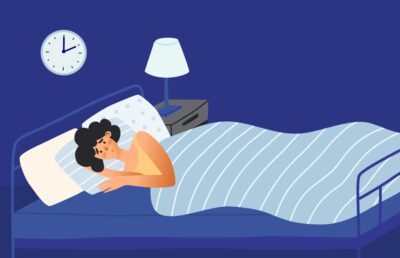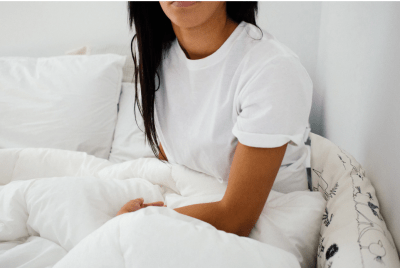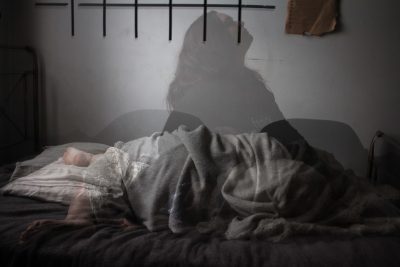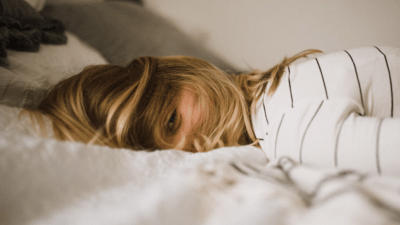What Causes Insomnia In Women?
- by Sharon Brandwein
- Updated: June 13, 2023
Table of Contents

If you ask five people what their insomnia looks like, you might get five different answers. Insomnia can look like the inability to fall asleep or waking too early. It can look like the inability to stay asleep or not getting enough quality sleep. It can be acute, lasting for only a spell, or drag on for months and even years.
We can say a lot about insomnia, but what we can’t say is that it plays fairly in the battle of the sexes. As a matter of fact, study after study shows that insomnia in women is far more common than in their male counterparts. And if we take an even closer look behind the curtains, it appears that sex-based and gender-based differences may account for the disparity.
Is Insomnia More Common In Women?
Unfortunately for women, insomnia is more common for them than their male counterparts.
“Insomnia is more common in women partially because women are carrying the stress and the worries and the labor of their families,” Dr. Whitney Casares, pediatrician, two-time American Academy of Pediatrics author and spokesperson, and founder of Modern Mommy Doc, tells Sleepopolis. “We know that women have a disproportionate amount of tasks to do in the home compared with their male partners, and [when] their head hits the pillow, all those to-dos that are still on their to-do list (as well as other stressors) tend to linger.”
And the idea that insomnia is more common in women is far from anecdotal; the differences are well-documented.
- One study found that the prevalence of frequent insomnia was higher among women than men (16 percent vs. 11 percent)
- One meta-analysis on gender differences in insomnia found that women are 58 percent more likely to experience insomnia than men
- And yet another study showed that insomnia is 1.3–2.0 times more common in women than in men.
Ultimately, the numbers vary, but the conclusions remain the same — insomnia is more common in women. Now, we must dig deeper into the why.
What Causes Insomnia In Women?
Valerie Cacho, MD, an integrative sleep physician, women’s sleep expert, and CEO of Sleephoria, tells Sleepopolis that not only have “fluctuating levels of estrogen and progesterone during perimenopause and menopause been associated with insomnia, but women tend to have higher rates of anxiety and depression, which can also result in disturbances in sleep like insomnia.”
If we take a bird’s eye view of it, we find that hormonal fluctuations associated with puberty, pregnancy, and menopause are often traveling on the same road as stress, mental health, and motherhood. In the end, all of these factors are making their way down a collision course — aka a prevalence of insomnia in women.
Hormones
“Biological conditions unique to women, like the menstrual cycle, pregnancy, and menopause, can affect how well a woman sleeps,” Lauri Leadley, CCSH, RPSGT, President and Clinical Sleep Educator at ValleySleepCenter, tells Sleepopolis. “This is because the changing levels of hormones that a woman experiences throughout the month and over her lifetime, like estrogen and progesterone, have an impact on sleep.”
At any given time, women have about 50 hormones coursing through their bodies. And when each one is responsible for managing a myriad of biological functions throughout their lives, starting one process and stopping another, the fallout from the ebb and flow (i.e., insomnia) makes perfect sense.
Casares also points out that the physical manifestation of those hormonal fluctuations tends to look different at each stage of a woman’s life. For example, she notes that hormonal changes and physical symptoms associated with premenstrual syndrome can stymie sleep by way of painful cramps or nausea. Similarly, menopausal women are more likely to have hot flashes and night sweats, which can make it difficult to get comfortable enough to fall asleep or stay asleep.
Menstruation
“In adolescence, that’s when we actually start to see women — younger girls — start to have more insomnia than men,” says Dr. Shelby Harris, Sleepopolis’ director of sleep health. “Up until adolescence, the rates of sleep problems are actually the same. That suggests a hormonal component.”
Menstruation typically begins around age 12, and when it does, it seems to mark the beginning of a women’s lifelong journey with hormonal fluctuations that can affect their sleep.
And while research shows that women experience changes in their sleep architecture across every phase of their menstrual cycle, the most profound changes have been associated with the luteal phase (the last phase of the menstrual cycle) which typically lasts about 12 to 14 days.
Specifically, women tend to experience longer sleep latency (the amount of time it takes to fall asleep), frequent waking, and lower sleep efficiency when compared to the follicular phase.
And considering that most women tend to experience the brunt of their PMS symptoms during said luteal phase, it’s easy to see why sleep may not come easy when those symptoms include menstrual cramps, backaches, headaches, and nausea.
Pregnancy
Pregnancy is a major factor that often leads to insomnia in women, and understandably so. Not only is it hard to negotiate a growing belly when bedtime rolls around, but pregnant mamas also have to deal with frequent bathroom trips as their baby negotiates sleeping accommodations of their own.
Beyond those physical changes, women also have to contend with a flurry of hormones that may tinker with their sleep. During the first trimester alone, progesterone (also known as the pregnancy hormone) skyrockets anywhere from four to six times their normal levels, and during the course of their pregnancy, women produce more estrogen than at any other time in their life.
Of course, that’s not all — Harris says heartburn, movement from your growing baby, vivid dreams, and sleep apnea caused by pregnancy can also be big challenges for pregnant women desperate for a good night’s sleep.
Perimenopause And Menopause
As women approach perimenopause and menopause, the band plays on with their hormonal fluctuations. Anyone who knows anything about menopause can tell you that night sweats, hot flashes, and anxiety are a fundamental part of the deal.
These symptoms may be relatively benign in terms of overall health, but they’re often uncomfortable enough and disruptive enough to keep some women watching the clock at night — so much so, that Harris says up to 50 percent of women in this phase of life may experience insomnia.
Stress And Mental Health
“Stress is tightly linked to insomnia,” says Casares. “And we know that stress can cause a lot of physical symptoms, including stomach aches, headaches, difficulty sleeping, or being significantly more tired compared with normal.”
We also know that women are two times more likely to be diagnosed with depression than men, and that insomnia and depression share a bidirectional relationship. Depression can cause insomnia and other sleep disturbances, and insomnia can exacerbate depression.
Motherhood And Insomnia
Casares says new babies and insomnia often go hand in hand for the vast majority of women. “If they are the primary caretakers in their home, that means that their sleep is significantly disrupted when that infant comes into the world,” says Casares. “And we know that women experience the effects of insomnia for a really prolonged period. Oftentimes mothers will experience insomnia for the entire first year of their child’s life,” says Casares, who also notes that, in some cases, those difficulties may continue as the woman ages.
And you don’t have to take our word for it; the effects of motherhood on sleep and its connection to sleep disturbances have been well-documented. One 2019 study, in particular, really piqued our interest. Not only did this study find that overall parental satisfaction with sleep hits an all-time low in the three months following childbirth, but the same study showed that erratic infant sleep patterns had a negatively disproportionate effect on mothers. Specifically, fathers of newborns lost about 13 minutes of sleep per night, while new mothers lost over one hour of sleep each night.
Getting Better Sleep As A Woman
Insomnia disproportionately affects women — pick a reason (see above), but Leadley says that a few lifestyle changes and modifications to your sleep hygiene may help you catch those elusive zzzs. Specifically, Leadley suggests the following solutions.
Establishing Regular Sleep And Wake Times
Research overwhelmingly shows that consistency is key to getting a good night’s sleep. Find a sleep and wake time that feel right for you — and get you within that seven-to-nine-hours-of-sleep sweet spot — and stick to them.
Changing Your Diet And Eating Habits
Women struggling with insomnia should consider limiting their caffeine and alcohol consumption. Additionally, try to avoid eating at least four hours or more before bedtime — especially if your snack has copious amounts of sugar!
Improving Your Sleep Environment
Think about removing computers and televisions from your bedroom, invest in some room-darkening blinds or draperies, and keep your bedroom temperature between 65 – 71 degrees.
Try Layers
Along with maintaining ambient temperatures in your room that are conducive to sleep, Casares suggests using layers of blankets instead of one heavy layer. This may prove to be especially helpful for menopausal women who frequently deal with personal temperature fluctuations courtesy of hot flashes, night sweats, and the ensuing chills.
Exercising In The Morning
While we know that exercise can have a wonderfully positive effect on sleep, Leadley suggests exercising in the morning to give belly fat a more robust kick in the pants.
When To See A Doctor
Leadley says, “if insomnia persists in spite of [an adapted] lifestyle, behavioral or diet changes,” it may be time to see your doctor. Sometimes insomnia in women may be the result of some underlying but treatable health issue that requires the help and care of a qualified medical health professional. With any luck, you and your doctor can identify and address the issue so that you can get back to sleep.
The Last Word From Sleepopolis
Insomnia is more common in women, and we can look at any number of sex-based differences and gender-based differences to account for the inequity. And while hormonal fluctuations top the list of causes, we can’t forget that mental health and motherhood often play significant roles too. Some women may be able to curb their insomnia through a series of lifestyle changes and modifications to their sleep hygiene, while others may only find relief with professional help.



